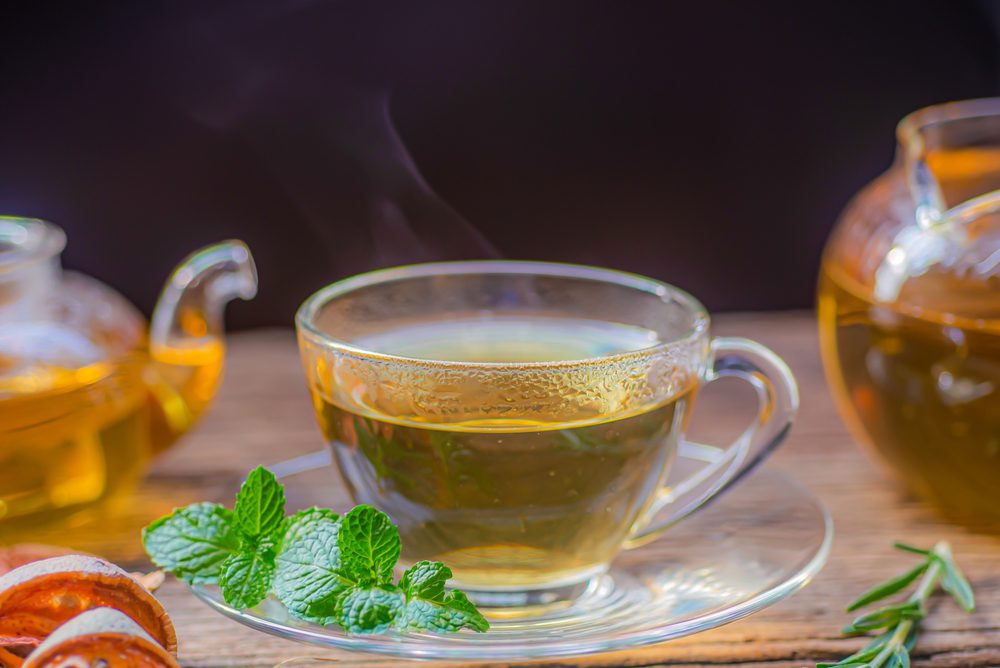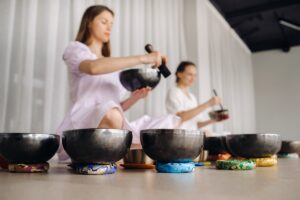What do you think about when you hear the word “tea?” For me, it’s a beautiful smell, it’s warmth, and calm just like a meditation session. Recently, I’ve come to find that tea can actually take your meditation sessions to a whole new level!
Having a cup of tea before you meditate can be a relaxing and soothing ritual that can help you get ready for your practice. In fact, the more I looked into this, the more interesting it became: experts say that some tea flavors can also make it easier to meditate by making you feel calm and peaceful.
Want to use tea as part of your meditation practice? You should make your tea before you sit down to meditate. From green tea to chamomile and Jasmine, here are the top flavors that might work magic for you too.
P.S.: As a special bonus, we offer some fun facts and warnings about each flavor, so let’s get started:

Chamomile tea
Chamomile tea is popular for a good reason. This plant is best known for its calming and soothing effects, which can help relax the body and mind. Obviously, these benefits help you get into a meditative state too!
The flowers of the chamomile plant are used to make the tea. Plus, the chamomile flowers contain chemicals like apigenin and luteolin that can help calm and relax you. If you drink chamomile tea before you meditate, it can be a soothing ritual that helps you get in the right mood for your practice.
Chamomile tea can also help people sleep better, which makes it a good choice for people who have struggle with insomnia. If you are allergic to ragweed or chrysanthemums, you should not drink chamomile tea because it could trigger your allergy. It’s best to contact a specialist before starting to enjoy this flavor on a regular basis.
Lavender tea
Lavender tea is another popular flavor of tea that experts say can help with meditation. While there I haven’t found much research on the matter, this plant generally helps people feel less anxious.
The dried flowers of the lavender plant are used to make the soothing tea. Lavender’s scent is just as important as the tea itself! Surprisingly, the scent can help calm the mind and body, which makes it easier to get into a meditative state. If you drink lavender tea before you meditate, it can be a soothing ritual that helps you get in the right mood for your practice. Lavender tea can also help you sleep better, which makes it a great choice for people who have trouble sleeping or insomnia.
Lemon balm tea
Accordingly, lemon balm tea is another popular tea flavor that can help you meditate better. In this case, the tea is made of dried leaves of the lemon balm plant. The resulting beverage has a light lemon flavor and a refreshing smell (trust me, you’ll love it!).
Lemon balm is thought to have a calming effect on the nervous system. In fact, this plant has long been used to treat stress, anxiety, and trouble sleeping. What’s more, lemon balm tea is also known for its ability to help people feel calm and clear their minds, which can help them concentrate and focus.
WARNING: If you’re dealing with thyroid problems should drink lemon balm tea in moderation or not at all. Please contact your doctor and stay safe!

Peppermint tea
Peppermint tea is without a doubt leading the charts in terms of tea flavors. But did you know it can help with meditation too? The tea’s strong minty smell and refreshing taste instantly energize your spirit and uplift your mood. This way, you enter the perfect state of mind for meditation.
Peppermint has a cooling and refreshing feeling because it has menthol in it. It also calms the body and mind, making it easier to concentrate and meditate. Peppermint tea can also help digestion, get rid of headaches, and ease cold and flu symptoms. If you drink peppermint tea before you meditate, it can be a soothing ritual that helps you get in the right mood for your practice.
WARNING: People with acid reflux should drink it in moderation or not at all, because it can cause heartburn. Also, women who are pregnant or nursing should talk to a doctor before drinking peppermint tea because it can change hormones.
Anyway, peppermint tea is great for meditation because it is refreshing and energizing. It can help clear the mind and improve focus and concentration, making it a great choice for people who want to use tea in their meditation practice.
Jasmine tea
While it’s not nearly as popular as peppermint, Jasmine tea is also fairly known among tea enthusiasts. This option is recognized for its calming and soothing effects, which can help relax your body and mind especially after a long day at work. Interestingly, the tea is made by letting the scent of fresh jasmine flowers soak into green tea leaves. The jasmine gives the tea a sweet taste and a light floral scent – and if that doesn’t make you want to try it, I don’t know what does!
Put simply, this flavor can help you enter the mood for each meditation session. Even the smell of jasmine alone can also help make a calm and quiet place for meditation, let alone its taste.
WARNING: If you are pregnant or have a medical condition, you should always talk to your doctor before drinking jasmine tea. Accordingly, some of its compounds can interact with certain medicines, so it’s better to be safe than sorry!
Green tea
Green tea is a popular flavor of tea, and experts say it can help with meditation. It is known for making people feel calm and able to concentrate.
After the leaves of Camellia Sinensis (the Green tea plant) are picked, they are quickly steamed or pan-fried to keep their green color and stop them from turning brown. This process is what gives green tea its green color and its mild, grassy taste. Interesting, huh?
What’s even more interesting is that some compounds of this drink have a calming effect on the mind and body. The top example is L-Theanine, an amino acid that can help improve your mood, help you relax, and help your brain work better. In other words, green tea is a great beverage to put you in the right spiritual state for meditation.
WARNING: If you’re pregnant or have a medical condition, you should always talk to your doctor before drinking green tea; sometimes its compounds might interact with some medical treatments, so make sure to double-check every detail.
To conclude, tea is a highly-recommended beverage to start your meditation sessions. Whether you’re a beginner or have plenty of experience in this field, enjoying a cup of tea can always uplift your spirit to reap the health benefits of meditation. Of course, it’s just as important to stay safe, so if you have a medical condition or you’re following a long-term treatment, just let your doctor know before taking a sip!
What’s your favorite tea flavor for meditation (or just having some quiet time alone)? Let us know in the comment section and we’ll get back to you with special tips to upgrade your experience!
You might be also interested about: Scientists Finally Proved Why Coffee Boosts Our Mood









